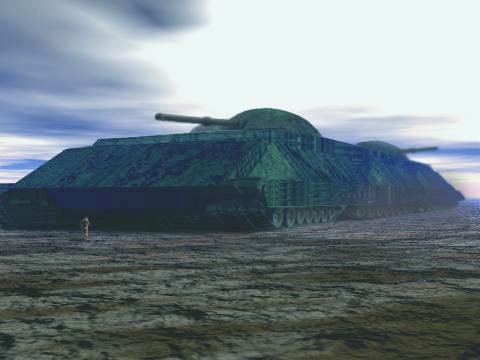(Adding categories) Tag: categoryselect |
No edit summary Tag: Source edit |
||
| (6 intermediate revisions by 5 users not shown) | |||
| Line 1: | Line 1: | ||
| − | |||
| − | |||
{| align="right" border="0" cellpadding="1" cellspacing="1" class="article-table article-table-selected" style="width:300px;height:500px;" |
{| align="right" border="0" cellpadding="1" cellspacing="1" class="article-table article-table-selected" style="width:300px;height:500px;" |
||
! scope="col"|Bolo Mark |
! scope="col"|Bolo Mark |
||
| Line 12: | Line 10: | ||
|- |
|- |
||
|Road Speed |
|Road Speed |
||
| − | | |
+ | |115 |
|- |
|- |
||
|Sprint Speed |
|Sprint Speed |
||
| Line 31: | Line 29: | ||
4x 240cm Howitzer |
4x 240cm Howitzer |
||
| − | 10x 40cm |
+ | 10x 40cm Mortar |
Heavy VLS missile system |
Heavy VLS missile system |
||
| − | 12x 25 |
+ | 12x 25 megajoule Anti-Personal Lasers |
|} |
|} |
||
| − | <span style="text-indent:18pt;">The last - and largest - standardized Bolo introduced into service. The Mark XXXIII weighed no less than 32,000 tons and mounted a main armament of three independently-turreted 200cm Hellbores with a secondary armament of fourteen 20cm Hellbore infinite repeaters in two lateral batteries. Equipped with a very sophisticated indirect fire system, the sheer firepower of the Mark XXXIII was a reversion to the old siege unit thinking, though it was normally referred to as a </span>''planetary''<span style="text-indent:18pt;"> siege unit, not merely a continental one. No one knows how many Mark XXXIIIs were actually built, but official planning called for them to be deployed in independent brigades of 24 units each. Despite the increase in weight, speed remained equivalent to the Mark XXXI, and the Mark XXXIII's </span>''internal''<span style="text-indent:18pt;"> counter-grav could supply the assault landing capability for which the Mark XXXII had required an auxiliary unit.</span> |
+ | '<span style="text-indent:18pt;">The last - and largest - standardized Bolo introduced into service. The Mark XXXIII weighed no less than 32,000 tons and mounted a main armament of three independently-turreted 200cm Hellbores with a secondary armament of fourteen 20cm Hellbore infinite repeaters in two lateral batteries. Equipped with a very sophisticated indirect fire system, the sheer firepower of the Mark XXXIII was a reversion to the old siege unit thinking, though it was normally referred to as a </span>''planetary''<span style="text-indent:18pt;"> siege unit, not merely a continental one. No one knows how many Mark XXXIIIs were actually built, but official planning called for them to be deployed in independent brigades of 24 units each. Despite the increase in weight, speed remained equivalent to the Mark XXXI, and the Mark XXXIII's </span>''internal''<span style="text-indent:18pt;"> counter-grav could supply the assault landing capability for which the Mark XXXII had required an auxiliary unit.'</span> |
| − | |||
| ⚫ | |||
| ⚫ | |||
| + | Confederation/Post-Concordiat Bolo Mark XXXIII's used Mark 7 Assault Landing Pods (ALP) in lieu of internal counter-grav. |
||
| Line 47: | Line 45: | ||
| + | <gallery type="slider" orientation="center"> |
||
| − | [[File:Boloscn3.jpg|left]][[File:Bolomk33.jpg|left]] |
||
| + | Boloscn3.jpg |
||
| + | Bolomk33.jpg |
||
| + | </gallery> |
||
[[Category:Bolos]] |
[[Category:Bolos]] |
||
[[Category:Vehicles]] |
[[Category:Vehicles]] |
||
Latest revision as of 22:22, 17 August 2021
| Bolo Mark | XXXIII |
|---|---|
| Year of Introduction | ???? |
| Weight | 32,000 tons |
| Road Speed | 115 |
| Sprint Speed | 500 |
| Indirect Fire | Strategic |
| Self Aware | Autonomous |
| Armament |
3x 200cm Hellbore 14x 20cm Hellbore 4x 240cm Howitzer 10x 40cm Mortar Heavy VLS missile system 12x 25 megajoule Anti-Personal Lasers |
'The last - and largest - standardized Bolo introduced into service. The Mark XXXIII weighed no less than 32,000 tons and mounted a main armament of three independently-turreted 200cm Hellbores with a secondary armament of fourteen 20cm Hellbore infinite repeaters in two lateral batteries. Equipped with a very sophisticated indirect fire system, the sheer firepower of the Mark XXXIII was a reversion to the old siege unit thinking, though it was normally referred to as a planetary siege unit, not merely a continental one. No one knows how many Mark XXXIIIs were actually built, but official planning called for them to be deployed in independent brigades of 24 units each. Despite the increase in weight, speed remained equivalent to the Mark XXXI, and the Mark XXXIII's internal counter-grav could supply the assault landing capability for which the Mark XXXII had required an auxiliary unit.'
- Source: A Brief Technical History of the Bolos by Prof. Felix Hermes, Ph.D.
Confederation/Post-Concordiat Bolo Mark XXXIII's used Mark 7 Assault Landing Pods (ALP) in lieu of internal counter-grav.



